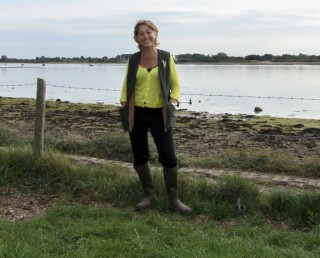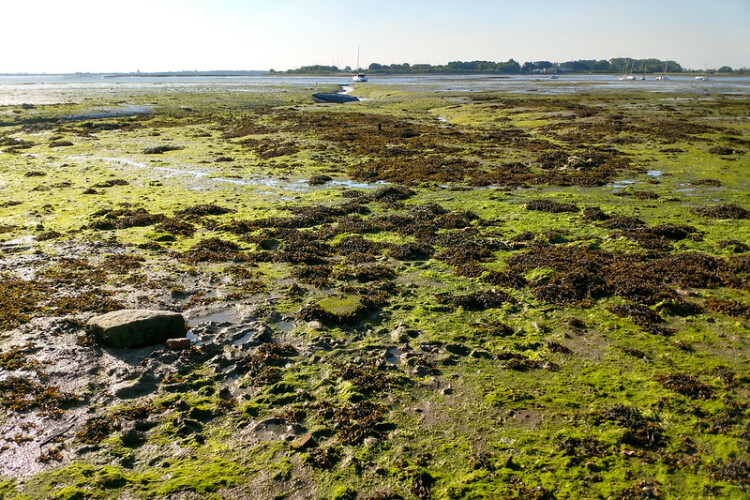The idea was actually developed by the Wildlife Trust, to remove lower-grade agricultural land from intensive production and create natural habitats to absorb pollution. But the government is running with it.
A moratorium on planning applications across Hampshire was put in place last year after Natural England raised the alarm about nitrates leaking into the Solent and stepped in.
Nitrate pollution comes from various sources, including farming, but new occupied dwellings add to the pressures through the waste water generated. Negative environmental effects include excessive green algae smothering rare habitats and wildlife, including the Solent’s internationally protected estuaries, salt marshes and seagrass beds, as well as protected birds such as curlews.
The Department for Environment, Food & Rural Affairs (Defra) has now announced a £3.9m fund to set up an online ‘nitrate trading’ auction platform. Through this, housing developers will be able buy credits to create new habitats, such as meadows, woodlands and wetlands, to prevent harmful levels of nitrates from new housing from reaching the Solent.
If the pilot site is successful, it could be extended and rolled out to other areas of England, Defra said. This will also inform the government’s wider work on market-based solutions to environmental issues – such as carbon offsetting, biodiversity net gain, water quality and flood risk management.
The south Hampshire nitrate trading scheme will also support a new nature reserve that opened this week at Warblington Farm – 60 hectares of woodlands and wetlands. It will be funded through the credits that housing developers purchase and help remove nitrates and in turn reduce pollution impacts on the Solent, Defra says.
Environment minister Rebecca Pow said: “I am thrilled to announce this funding which uses nature-based solutions to alleviate the housing pressure in the local area. Not only will this innovative scheme unlock thousands of much-needed homes for the local area, but it will provide habitat rich areas for wildlife in a true win-win.
“As the nation recovers from coronavirus, it’s more vital than ever that we build back greener, and this project will also help people connect with nature by providing more green spaces for them to enjoy.”
Natural England advised on the scheme and helped select suitable sites to create new areas for habitat creation.

Natural England chair Tony Juniper – a former director of Friends of the Earth and Green Party parliamentary candidate – said: “This is a beautiful part of Hampshire, rich with wetlands, coastal inlets and shingle beaches, and it’s no wonder that more people wish to live in the area, creating demand for new homes. More people does, however, mean more nitrogen getting into the environment, and this is causing the growth of green algae ‘mats’ in the Solent, affecting protected habitats and wildlife along the south coast.

“This innovative new scheme that Natural England has helped design will not only help nature’s recovery in the area, but also address the historic demand for new housing around the Solent.
“It is but one example of how it is possible to find solutions to apparently intractable challenges, and to fund them, meaning that we can build more homes while at the same time protect and enhance the rich and varied wildlife of this unique area. It also reveals how it is possible to harness regulation in a positive way, to create incentives for the recovery of the local natural environment, in turn benefiting people living in the area.”
The nitrate trading platform pilot will be rolled out over the next two years, Defra said, and delivered jointly with the Ministry for Housing, Communities & Local Government, Natural England and the Environment Agency.
Defra is also currently in discussions with the Hampshire & Isle of Wight Wildlife Trust about a loan to purchase further land for the scheme.
Debbie Tann, CEO of Hampshire & Isle of Wight Wildlife Trust, said: “Nitrate pollution in the Solent wreaks havoc with our vital marine ecosystems, suffocating the life out of our seas. This is a really critical issue and, until recently, every new house built simply added to the pressure.
“Now, thanks to Natural England and Defra, we are taking important steps towards addressing this problem – ensuring that houses can only be built if the nitrate impact is properly addressed. We are delighted that government is supporting our nature-based solution and this funding will enable us to create wonderful new nature reserves for wildlife at the same time as helping to clean up our environment.”
Got a story? Email news@theconstructionindex.co.uk



